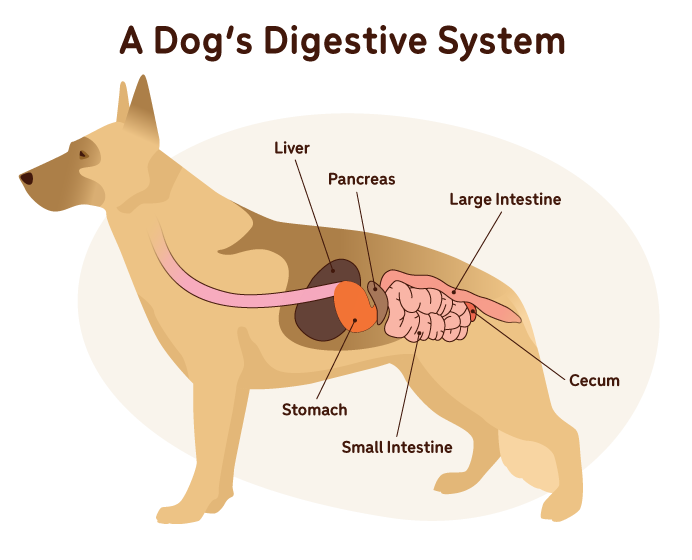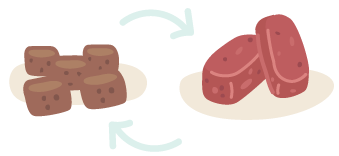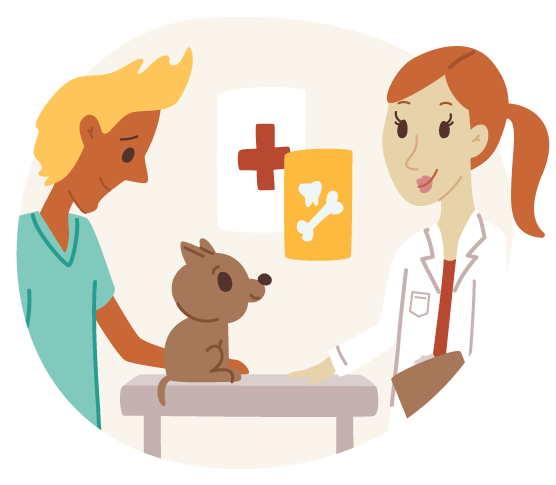Signs of an Unhealthy Digestive System in Dogs

by Narelle Cooke, Canine Nutritionist

The digestive system plays a major role in the overall health and wellbeing of our dogs due to the fundamental role it plays in breaking down food into nutrients, which the body can then use for energy, growth, detoxification, cellular repair, hormone and neurotransmitter production, and healthy immune function – just to name a few! Unfortunately, poor digestive health (often referred to as ‘dysbiosis’), plagues many dogs, with the research showing that gastrointestinal problems are the primary reason for vet visits.1
There are many factors that can contribute to poor digestive function in dogs, and symptoms may come on suddenly or be more chronic in nature. As our dogs can’t tell us when something is wrong, we should always be on the look-out for any indicators that things aren’t as they should be when it comes to their gut health.
Signs and symptoms of poor gut health in dogs
Poor gut health can manifest in many ways – from the obvious signs of diarrhoea and vomiting to the more subtle symptoms of abdominal tenderness and lethargy. The challenge for pet parents is that many digestive issues can appear similar, even though they may be due to very different causes and underlying health conditions. So how do we identify what’s normal, what’s a temporary hiccup, and what requires more urgent veterinary attention? Let’s start by outlining some of the more common signs and symptoms that may indicate that our dog’s gut health is compromised:
- Constipation
- Diarrhoea
- Vomiting or regurgitation
- Increased and/or worse smelling flatulence
- Excessive drooling
- Reduced appetite
- Weight loss
- Blood or mucus in the stools
- Dehydration
- Abdominal bloating
- Reluctance to move or inability to get comfortable
- Hunched or ‘praying’ posture
- Abdominal tenderness
- Whining or yelping when handled
Common causes of an upset gut in dogs
Unfortunately, many common dietary and lifestyle factors that our dogs are exposed to are known upset their digestive system by contributing to the development of leaky gut, damaging their resident microbiota and triggering gastric inflammation. Key examples include:
Medications

While medications are often lifesaving, they tend to come with side-effects when it comes to gut health. For example:
- Acid-lowering medications such as proton-pump inhibitors are consistently linked with profound changes in the gut microbiota,2 as well as being associated with an increased risk of enteric infections.3, 4 Potential side effects include belching, diarrhoea, constipation, bloating and lack of appetite.
- Anti-inflammatory medications such as non-steroidal anti-inflammatory drugs (NSAIDs) are a common causes of acute gastric erosion and chronic gastric ulceration.5 This can manifest as vomiting, bloody stool/diarrhoea, lack of appetite, excessive drooling and abdominal pain.
- Antibiotics are known to cause rapid and significant drops in microbial numbers and diversity, the effects of which can persist for months or even years.6 Common gastric side effects include stomach irritation, vomiting, diarrhoea, and poor appetite.
Always speak to your vet if you notice any adverse side effects from your dog’s prescription medications.

Dietary indiscretion
It’s not uncommon for our dogs to eat things that they shouldn’t. This might include something they picked up off the ground during a walk, garbage that they pulled out of the bin when you weren’t looking, or table scraps that the kids didn’t want to eat! This is probably one of the most common triggers of an upset stomach in our dogs and will often become obvious fairly quickly with the onset of diarrhoea or vomiting, which typically resolves itself within 24 hours. However, depending on what was eaten, this may require immediate medical care, so always monitor your dog, and make a note of what they might have eaten.

Abrupt changes in diet
In our enthusiasm to give our dogs the best diet possible, we can often be too hasty in changing them over to a new food, which often ends badly for everyone! As pet owners, we need to understand that any changes we make to our dog’s diet will also affect their gut flora, and that’s because different bacteria in the gut have different preferences when it comes to what they like to eat.7 For example, there are certain bacterial species that just love the sugar hit that comes from commercial kibbles that are high in carbohydrates - and so they multiply and grow when that’s the primary food source, whereas a raw food diet based on wholefoods such as fruits, vegetables and high-quality animal proteins will feed and promote the growth of a different group of bacteria. That’s why dogs who are suddenly switched to a new diet – particularly if going from kibble to a raw food diet, can sometimes experience bloating, gas and loose stools – it’s just their resident gut bugs biota adjusting to a new food source. The best advice here is to takes things slowly.

Allergies and intolerances
An increasing number of dogs are developing adverse food reactions which often results in digestive symptoms such as diarrhoea, vomiting, reflux and excessive gas. If you suspect that your dog may be suffering from digestive issues due to a food intolerance or food allergy, the best approach is to feed a single protein diet for at least 8 weeks so that you can figure out what might be triggering the problem. It also gives your dog’s gut the time it needs to heal. This means that you want to feed or look for a commercial formula that contains the meat, offal and bone of a single animal species – for example, just goat or just kangaroo. Both of which are great options as they have lower allergenic properties than some other protein sources.

Stress
Stress can negatively impact our dogs is two key ways. Evidence demonstrates that stress (psychological, environmental and physical) has the ability to alter the composition, function and metabolic activity of the gut microbiota in ways that may be detrimental to health. This can include lowered microbial diversity, an increase in pathogenic bacteria, the production of potentially toxic compounds, compromised gut barrier integrity, and increased systemic inflammation.8
Stress and anxiety can also trigger a variety of digestive problems in our dogs due to the powerful communication channel in the body known as the gut-brain axis. When our dogs experience stress, it triggers the release of various hormones and chemical messengers that tell the body that digestion is not a priority right now. This can lead to reduced gastric function and an increase in gastric transit time, leading to diarrhoea and other symptoms of an upset stomach.
When to see a vet

Some common digestive system signs such as vomiting, diarrhoea, and constipation may also occur because of more serious conditions in the body, such as infectious diseases, intestinal blockages, pancreatitis, adrenal, kidney and liver disease, or even cancer. Even mild conditions have the potential to become serious if left untreated for too long.
So it’s always better to be on the safe side and seek veterinary care if symptoms persist for more than a couple of days, if your dog seems very ill, or if you’re not sure what might have triggered their symptoms. But you should always see your vet asap if any of the following apply:
- You have a young puppy or an older senior dog
- Your dog suffers from a chronic health condition
- Your dog is showing symptoms of bloat
- The vomiting and/or diarrhoea is ongoing, or blood is present
- Your dog is exhibiting abdominal pain and tenderness
- Your dog has become listless and/or dehydrated
Simple ways to improve your dogs’ digestion
If you have an adult dog who is otherwise healthy, acting like their normal selves, and only having mild gastric symptoms, there are some simple strategies that can be employed to support and strengthen their digestive system:

Raw food diet
Lower bacterial diversity in dogs is commonly associated with gastrointestinal dysbiosis, intestinal inflammation and compromised immune function.9, 10 Several studies have shown that dogs fed a natural raw food diet have a more diverse and abundant microbial composition and healthy gut functions, as compared to dogs fed commercial kibble.11, 12 These results are consistent with numerous other studies that highlight the benefits of raw food feeding for our dogs.13, 14 So if your dog is currently on a pure kibble diet, transitioning them slowly onto a partial or fully raw food diet will be an important part of promoting a healthier gut and overall good health.
Probiotics
The research is now very clear that probiotics (often referred to as ‘good bacteria’) play a fundamental role in health. All dogs have good bacteria in their digestive tract, but sometimes the balance can be off. A daily probiotic supplement may help to:
- Improve the integrity of the gut lining (making it less ‘leaky’)
- Reduce inflammation (we now know that inflammation is the root of all disease)
- Stimulate the immune system
- Help the body defend against pathogenic bacteria
- Aid in restoring the balance of good vs bad bacteria
- Reduce diarrhoea associated with antibiotic use and inflammatory bowel disease
- Improve nutrient absorption
- Improve digestive function and bowel regularity
- Improve bad breath
Prebiotics
Prebiotics are specific types of dietary fibre that are selectively fermented by the beneficial organisms in your dog’s intestine leading to the production of compounds called short chain fatty acids, which are highly beneficial to our dogs overall gut and immune health. By acting as a food source for bacteria, prebiotics also work to promote the growth of beneficial bacteria, helping to keep pathogenic organisms at bay.
Digestive enzymes
Digestive enzymes are produced and secreted by the gastrointestinal system to break down the food our dogs eat. They play a significant role in ensuring that our dogs are getting all the nutrients they need to thrive. Most types of processed dog foods are heat treated multiple times throughout the manufacturing process. Such heat treatment destroys the enzymes naturally present in foods, making them non-functional. Supplementing our dogs with a variety of different digestive enzymes can help to improve the breakdown and digestion of food and reduce symptoms such as belching, reflux, bloating, gas and diarrhoea.
Summing up
Poor gut health disrupts overall health and wellness and reduces quality of life. As any dog owner will know, digestive issues are common, with most dogs experiencing episodes of an upset stomach at various times throughout their lives – puppies even more so! There’s growing evidence to support the safe and beneficial use of ingredients such as prebiotics, probiotics and digestive enzymes for our dogs’ gut health, in addition to feeding them a raw food diet. However, common sense must always apply. If your dog is showing any of the symptoms mentioned, and you have any concerns for their wellbeing, always consult with your veterinarian.
About the Author - Narelle Cooke, Canine Nutritionist.

Narelle is a clinical Naturopath, Nutritionist and Herbalist for both people and pets, and operates her wellness clinic ‘Natural Health and Nutrition’ in Dural, Sydney.
Being a lifelong dog-owner and currently meeting the demands of three French Bulldogs, two German Shepherds and a Burmese cat, Narelle is as passionate about the health and wellbeing of our pets as she is about their owners. And it was this strong desire to see her own pets live their longest and best lives that led her to hours of personal research and additional study in the area of natural animal health and nutrition.
· Bachelor of Health Science(Naturopathy) (ACNT)
· Bachelor of Agricultural Science (honours) (The University of Melbourne)
· Advanced Diploma of Naturopathy (AIAS)
· Advanced Diploma of Nutritional Medicine (AIAS)
· Advanced Diploma of Western Herbal Medicine (AIAS)
· Certificate III in Dog Behaviour and Training (NDTF)
· Certificate in Natural Animal Nutrition (CIVT)
· Certificate in Animal Health Sciences (CIVT)
· Certificate in Animal Nutrition (HATO)
REFERENCES
1. Rakha, G.M., Abdl-Haleem, M.M., et al. (2015). Prevalence of common canine digestive problems compared with other health problems in teaching veterinary hospital, Faculty of Veterinary Medicine, Cairo University, Egypt. Veterinary World. 8(3): p. 403-411. DOI: 10.14202/vetworld.2015.403-411.
2. Imhann, F., Bonder, M.J., et al. (2016). Proton pump inhibitors affect the gut microbiome. Gut. 65(5): p. 740-748. DOI: 10.1136/gutjnl-2015-310376.
3. Leonard, J., Marshall, J.K., et al. (2007). Systematic review of the risk of enteric infection in patients taking acid suppression. Am J Gastroenterol. 102(9): p. 2047-2056. DOI: 10.1111/j.1572-0241.2007.01275.x.
4. Janarthanan, S., Ditah, I., et al. (2012). Clostridium difficile-associated diarrhea and proton pump inhibitor therapy: a meta-analysis. Am J Gastroenterol. 107(7): p. 1001-1010. DOI: 10.1038/ajg.2012.179.
5. Webb, C. and Twedt, D.C. (2003). Canine gastritis. Veterinary Clinics of North America: Small Animal Practice. 33(5): p. 969-985. DOI: 10.1016/s0195-5616(03)00052-4.
6. Francino, M.P. (2015). Antibiotics and the Human Gut Microbiome: Dysbioses and Accumulation of Resistances. Front Microbiol. 6: p. 1543. DOI: 10.3389/fmicb.2015.01543.
7. Riaz Rajoka, M.S., Shi, J., et al. (2017). Interaction between diet composition and gut microbiota and its impact on gastrointestinal tract health. Food Science and Human Wellness. 6(3): p. 121-130. DOI: 10.1016/j.fshw.2017.07.003.
8. Karl, J.P., Hatch, A.M., et al. (2018). Effects of Psychological, Environmental and Physical Stressors on the Gut Microbiota. Front Microbiol. 9: p. 2013. DOI: 10.3389/fmicb.2018.02013.
9. Valdes, A.M. (2018). Role of the gut microbiota in nutrition and health. BMJ. 36(1): p. 36-44.
10. Pilla, R. and Suchodolski, J.S. (2019). The Role of the Canine Gut Microbiome and Metabolome in Health and Gastrointestinal Disease. Front Vet Sci. 6: p. 498. DOI: 10.3389/fvets.2019.00498.
11. Kim, J., An, J.U., et al. (2017). Differences in the gut microbiota of dogs (Canis lupus familiaris) fed a natural diet or a commercial feed revealed by the Illumina MiSeq platform. Gut Pathog. 9: p. 68. DOI: 10.1186/s13099-017-0218-5.
12. Sandri, M., Dal Monego, S., et al. (2017). Raw meat based diet influences faecal microbiome and end products of fermentation in healthy dogs. BMC Vet Res. 13(1): p. 65. DOI: 10.1186/s12917-017-0981-z.
13. Schmidt, M., Unterer, S., et al. (2018). The fecal microbiome and metabolome differs between dogs fed Bones and Raw Food (BARF) diets and dogs fed commercial diets. PLoS One. 13(8): p. e0201279. DOI: 10.1371/journal.pone.0201279.
14. Bermingham, E.N., Maclean, P., et al. (2017). Key bacterial families (Clostridiaceae, Erysipelotrichaceae and Bacteroidaceae) are related to the digestion of protein and energy in dogs. PeerJ. 5: p. e3019. DOI: 10.7717/peerj.3019.
